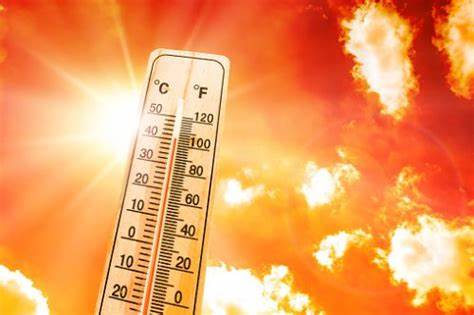News
Heat Wave: Nigerian Govt Issues Fresh Advisory

The poor electricity supply being experienced across the country may have worsened the situation for many Nigerians
By Mariam Ileyemi
The Nigerian government has once again issued a new advisory on how to cope with the prevailing heat wave in the country.
The latest advisory by the Federal Ministry of Environment follows an earlier warning by the Nigeria Meteorological Agency (NiMet) which predicted prolonged heat waves across the country, with temperatures reaching 39°C in the South and 41°C in the North.
NiMet had warned that the high heat level can cause dehydration, heat-related illness, and respiratory issues, among other chronic conditions.
According to NiMet, the northern part of the country will expect to experience more heat than the southern region.
The Minister of State for Environment, Ishaq Salako, told PREMIUM TIMES on Wednesday that the advisory is relevant for the season because “according to the NiMET Seasonal Climate Prediction, the heat wave is expected to be prolonged and will be with us for a while despite the rainfall.”
Consequence of heat wave
According to the advisory, exposure to heat waves can pose serious health, social, environmental, and economic risks, adding that infants, children, pregnant women, and the elderly are especially vulnerable to heat stress.
Some of the common symptoms of heat stress are dry lips, excessive thirst, dizziness, nausea, heat rashes, mild fever, confusion, fainting, and high body temperature for longer than two hours.
It added that no urination in more than eight hours or dark urine, rapid heartbeat, and breathing are other symptoms to look out for.
NiMet also noted specifically that dehydration from the heat could cause fainting; Chickenpox disease, Measles, and heat rash.
Preventive measures
The environment ministry advised Nigerians to plan their outdoor activities to avoid unnecessary exposure to the heatwaves and keep an emergency kit at home that contains oral rehydration salt (ORS) packets, a thermometer, towels or clothes to wet for cooling, and a handheld fan with batteries.
The advisory reads in part: “When possible, close the curtains during the hottest parts of the day and open windows at night time to cool down the house.
“Do not go outside during the hottest times of the day if you can avoid it. When outside, wear sunscreen and try to stay in the shade or use hats and umbrellas for protection.
“Drink water at regular intervals before you are thirsty. Wear light and loose-fitting clothing. Reduce physical activity and avoid participating in outdoor sports in the central hours of the day.”
Poor electricity supply worsens the situation
The poor electricity supply being experienced across the country may have worsened the situation for many Nigerians.
Across social media platforms, Nigerians have lamented the epileptic power supply and on many occasions have called out the nation’s Minister of Power, Adebayo Adelabu.
Earlier in February, in Port Harcourt, women protested at the office of the power distribution company, saying their husbands no longer make love with them at night due to excessive heat and poor power supply.
Many also lamented the high cost of fuel which is the consequence of the removal of subsidy on petroleum products by President Bola Tinubu. The high cost of fuel has denied many the opportunity to provide electricity through generating sets.


 News24 hours ago
News24 hours agoNIGERIAN BREWERIES PARTNERS OZA CARNIVAL

 Top Stories11 hours ago
Top Stories11 hours agoTinubu’s Aide Condemns Plan To Reinstall ‘Jesus Is Not God’ Banner In Lekki Mosque

 Top Stories6 hours ago
Top Stories6 hours agoBreaking: FIRS Announces Fresh Recruitment, See Eligibility Criteria, Application Deadline

 News12 hours ago
News12 hours agoPetrol To Sell ₦935/Litre From Today – IPMAN

 Top Stories12 hours ago
Top Stories12 hours ago2025 Budget Cannot Address Nigeria’s Economic Challenges – Atiku

 Top Stories9 hours ago
Top Stories9 hours agoPrimate Ayodele’s Prophecies For 2025

 Entertainment11 hours ago
Entertainment11 hours agoI will be more influential in Nigeria than UK – Tobi Adegboyega

 News11 hours ago
News11 hours agoPresident Tinubu’s reforms not responsible for food stampedes – FG







